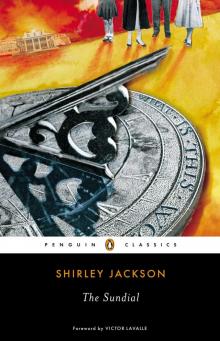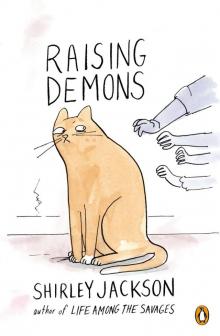- Home
- Shirley Jackson
The Bird's Nest Page 7
The Bird's Nest Read online
Page 7
Handkerchief again to her eyes, she held out to me a letter which, as helplessly, I took. “Do you want me to read this?” I asked, and she nodded.
I took it to my desk, where I had set my glasses, and held it under the lamp, and read, half-aloud: “Dear Mr. Althrop, The Museum of Natural Arts and Sciences of the City of Owenstown, although it would be pleased to display your interesting collection of matchbook folders, is nevertheless a non-profit, endowed organization, and as such is not in a position to pay for donated exhibits. Therefore, with great regret, I must inform you that you are a silly silly foolish girl and you are going to be sorry when i catch you—”
“Indeed,” I said. “Singular.” The letter was typewritten carefully, up to the line which began “you are a silly silly,” etcetera. These last few words were handwritten in heavy black pencil, in a straggling, ill-formed hand. “Singular indeed,” I said again.
“I typed it this morning,” Miss R. said, tormented into speech. “It was on my desk to finish this afternoon and when I came back from lunch it was like that and I—”
“Quietly,” I said, “Miss R., quietly, please.”
“But I don’t want him to get the letter. Mr. Althrop.”
“Surely not. Now, you say you discovered this when you came back from lunch?”
“It was right on my desk where I left it.”
“Pardon me, dear Miss R., but is there anyone in your office who might wish to do you an injury? Discredit your work, perhaps?”
“I don’t think so. I don’t know of anyone, Mostly,” said the poor girl, “they don’t care whether I work or not.”
“I see.” I longed to speak to R2, to ascertain the truth of R1’s opinions of her office mates, but the time was certainly not ripe for summoning my friendly R2, and I had to make what unwilling use I could of R1. I questioned her closely about her office, its availability to others, the time she had taken for lunch, even the Mr. Althrop to whom the letter was addressed, of whom she knew nothing. His letter had simply been given her to answer in the form used for such refusals, and that was all she knew—that, and the fact that the letter would now have to be done over, which, even considering Miss R.’s feelings about her personal neatness, seemed a disproportionate cause for her grief; she told me over and over that Mr. Althrop must not have the letter; she wanted, with more passion than I had seen R1 bring to anything, to take the letter off with her and hide it, and, even though I smiled at the childish notion that an error hidden is an error forgotten, I agreed with her that the letter must surely be done over, and offered, indeed, to aid her in an apology to her superiors for the delay, if such was required.
When Miss R. had calmed herself sufficiently, I sent her home. Our usual treatment was impossible after the upsetting experience in her office; I sent her home tranquil, and resolved to question R2 at the earliest opportunity, to see if she in turn could throw any light upon this bewildering experience. My hoped-for opportunity came at Miss R.’s next visit, when, seeing her in what was almost her old sullen state, I ventured to suggest our usual hypnotic treatment, and got a sulky permission, although I knew by that time—I believe Miss R. did not—that her permission was hardly necessary; I could by then subdue her into the trance state at will; without some strong motive for resisting, she could no longer revolt against my treatment. Thus is was possible for me to summon my friend R2 with ease, and I was splendidly glad to see her that day. My usual formalities regarding her name and address were spoken, I believe, in a tone of real jubilation, and I know she greeted me with equal enthusiasm. I never met R2 without a strong impulsive regret for the person Miss R. might well have been for all this time, so securely shut away, so well forgotten, and I believe that a large part of my determination upon Miss R.’s cure was exerted upon R2’s behalf; perhaps I saw myself—even I!—as setting free a captive princess.
At any rate, it was with deep disappointment that I heard that R2, usually so helpful, was now completely in the dark about the ugly lines scrawled upon the bottom of Miss R.’s letter, and unable to help me at all. She could only suggest that Miss R. had, through her very inoffensiveness, made an enemy in her office who had chosen this cowardly means of avenging herself. “Not everyone,” said R2 in her gentle way, “is as lucky as I am; everyone I meet is kind to me,” and she smiled at me.
This explanation, however, seemed to me manifestly impossible, if only because it was as difficult to imagine Miss R.’s making an enemy as it was to imagine her making a friend. Beyond this R2 had no suggestions to offer, and I determined at last upon trying a method which I had so far not found necessary—i.e., a deeper hypnotic trance, in which I hoped should stand revealed those facts and incidents about which R2 was as ignorant as myself.
It was certainly true that the answers to many of our questions lay deeply hidden in Miss R. herself, and I believed implicitly that only the most penetrating investigation would disclose them. I therefore threw R2, my pretty one, into a deeper hypnotic sleep, and watched aghast as her soft features coarsened again into those of the fiendish face I so well remembered and which I already feared sincerely and instinctively. She first began those twistings of her hands which I remembered so well, and then her face contorted and—I at the same time wanting badly to awaken her, and drive out the possessing demon—her mouth turned crookedly down into the evil smile I had seen before, and she brought her hands to her eyes in what seemed a desperate attempt to open them.
Hence, Asmodeous, I thought, and said quietly, “I prefer your eyes closed, please.”
“What,” she said, or rather shouted, in the roughest voice I have ever heard, “you giving me orders again, wicked man? I warn you that one of these days I am going to eat you!” She began to laugh again, and, dismayed, I thought of adverting to my opening formula, hoping to quiet her. “What is your name?” I asked her, in my levellest tone.
She stopped laughing at once, and said demurely (and oh, the cruel crooked mask on the face of R2!) “I am Elizabeth R., doctor dear, indeed I am. You must not think, doctor dear, that because I am sometimes a little bit rude to you that I do not respect you deeply, very very deeply indeed, doctor dear, very deeply indeed.”
This, said with an echo of the wild laughter, and an air of mockery that shocked me, coming from a person and face still strongly reminiscent of my own R2, almost with her own voice, interrupted my next question and I was still endeavoring to collect my thoughts when she went on in the same jeering voice, “And Elizabeth is going to tell you how sorry she is to have spoken to you so, doctor dear, indeed she will, and I myself am going to make her do it.”
“I should think you would,” I said irritably. “Now, please, Miss R., let us continue with the questions. I should like to hear more about this annoying letter which—”
She began to laugh again, and, mindful of my nurse in the next room, I attempted to quiet her by lowering my voice slightly so that she would have to be more restrained in order to hear me. “Do you think you are able to give me any information?” I asked.
“I can tell you all about it, my good friend.”
“Yes?”
“And I will, too, if only . . .” She dragged out her sentence tormentingly. “If only you will let me open my eyes,” she finished, laughing again.
Letter or not, I had had almost enough of this rude creature. “You will continue to keep your eyes closed,” I said sharply, “and if you can give me any information, I certainly expect you to do so. Now, after you had typed the letter—”
“I? I cannot type.”
“The letter,” I said shortly, “was certainly typewritten.”
“By her, surely. You don’t expect that I trouble myself to do her work?”
I was bewildered. “Her?” I said.
“Elizabeth,” she said in a great shout, “your dear Miss R., Lizzie the fool, Lizzie the simple.” And she screwed her face up into a dreadful parody
of Miss R.’s usual vacant expression. (And forgive me, reader, if I say that in the midst of my distress I was tempted to laugh; that she should mock R2 troubled me greatly, but R1 had no such hold upon my friendship.)
“Then,” I asked her, “who are you?”
“I am myself, doctor dear, as you will soon find out. And who, do you suppose, are you?”
“I am Doctor Wright,” I said, somewhat stiffly.
“No,” she said, shaking her head and grinning at me from under her hands, “I believe you are an imposter. I believe you are Doctor Wrong.” Her voice rose again in laughter. “And you are asking questions,” she went on, shouting, “which are most embarrassing indeed.”
“If you are not quiet,” I said, with all the authority I could command, “I shall awaken you.” This, spoken at random—and, indeed, what I most wanted at the moment to do—turned out to be an unexpectedly useful threat; she was immediately silent, and lay back against the chair.
“May I open my eyes?” she asked meekly.
“You may not.”
“I shall open my eyes.”
“You shall not.”
“Someday,” she said evilly, rubbing her hands against her eyes, “I am going to get my eyes open all the time and then I will eat you and Lizzie both.” She was silent, and seemed to be meditating, and then she said quietly, “Doctor Wrong. And Lizzie the fool.”
“Why, tell me, do you want to harm Elizabeth?”
There was another long pause, and at last she said, with hatred in her voice, “She’s outside, isn’t she?”
• • •
This was, indeed, a dismaying turn to Miss R.’s case. The cure had seemed so simple, so much a matter of time and patience before we set our feet on the right path and brought Miss R. home to health and vigor, and now, here, barring our way, gibbering and mouthing and shouting foulness, was a demon whose evil seemed at first almost unconquerable. The mind is a curious thing, to be sure, for I found myself angry rather than frightened, much in the manner of a knight (rather elderly, surely, and tired after his long quest) who, in the course of bringing his true princess home, has no longer any fear, but only a great weariness, when confronted in sight of the castle towers by a fresh dragon to slay.
Miss R.’s treatments had now gone on for several months, and I began to see that it would be a longer matter than I had heretofore suspected. The considerable improvements in the minor aspects of her health, which she found so incredibly wonderful, were perhaps the only progress we had so far made, and we were, I confess, certainly no nearer to understanding. I know as well as any medical man that the concept of “demonic possession” has been largely given up as a diagnosis; naturally Miss R.—and her aunt, of course, a dragon of a different sort, whom I had yet to encounter face to face—were kept in ignorance of the new development in Miss R.’s case; neither of them knew more of the treatment than the superficial improvement in Miss R., and I believe that they thought the incomparable Doctor Wright was performing miracles of restoration. I felt strongly that it would be unwise to inform Miss R. of the deeper progress, or lack of it, in her case, because of the danger of alarming her and setting us back in the small improvement we had made; Miss R., being in an hypnotic trance during the greater part of her time spent with me, knew nothing of what occurred, and her aunt knew nothing because neither Miss R. nor Miss R.’s doctor told her. I had called Ryan and told him briefly my conclusions about Miss R.’s case and my proposed method of treatment, and, since he was a busy man (your jovial, hearty physician so often is, regardless of his abilities) I had not found myself troubled in that neighborhood further.
Ruefully, then, I added a new number to my notes—R3, the hateful, the enemy. Perhaps my numerical system was at fault, perhaps I was too persuaded of my belief that we could slough off the paralyzing past and bring back Miss R. as R2, perhaps the rarity of the case and the horrid aspects of it slowed down my usually acute perceptions—it was, at any rate, quite some time before I, dreaming over my comfortable fire at home, half-asleep with my book fallen to the floor and the first intimations of dream touching me—it was not until then, some time later, that I first recognized what I should have known at once, and saw through to the correct diagnosis of Miss R.’s case.
Now, for the layman, demonic possession would do as well as anything to describe Miss R. at that time, and in my heart I suspect that the pictures are close: I remember most vividly Thackeray’s words, which I must have been reading before I slipped off, and which stay with me still: “All of you here must needs be grave when you think of your own past and present. . . .” And I before the fire, alone, and almost dreaming, to awaken remembering that devil’s face.
But let me turn to a medical authority, whose more palatable phrases hold out hope of a cure more certain (and more permanent) than mere exorcism: “Cases of this kind are commonly known as ‘double’ or ‘multiple personality,’ according to the number of persons represented, but a more correct term is disintegrated personality, for each secondary personality is a part only of a normal whole self. No one secondary personality preserves the whole physical life of the individual. The synthesis of the original consciousness known as the personal ego is broken up, so to speak, and shorn of some of its memories, perceptions, acquisitions, or modes of reaction to the environment. The conscious states that still persist, synthesized among themselves, form a new personality capable of independent activity. This second personality may alternate with the original undisintegrated personality from time to time. By a breaking up of the original personality at different moments along different lines of cleavage, there may be formed several different secondary personalities which may take turns with one another.” (Morton Prince, The Dissociation of a Personality, 1905.)
I myself had already met Miss R. in three personalities: R1, nervous, afflicted by driving pain, ridden by the horrors of fear and embarrassment, modest, self-contained, and reserved to the point of oral paralysis. R2 was, it was assumed, the character Miss R. might have been, the happy girl who smiled and answered truly and with serious thoughtfulness, pretty and relaxed, without the lines of worry which so deformed R1’s face; R2 was largely free of pain, and could only sympathize sweetly with R1’s torments. R3 was, on the other hand, R2 with a vengeance: where R2 was relaxed, R3 was wanton; where R2 was unreserved, R3 was insolent; where R2 was pleasant and pretty, R3 was coarse and noisy. Moreover, each of the three had a recognizable appearance—R1, of course, the character I had first met, shy and unattractive by reason of her timidity and clumsiness; R2, amiable and charming; R3, the rough, contorted mask. The shy, fleeting smile of R1, the open, merry face of R2, were in R3 a sly grin or an open shout of rude laughter; if it be suspected that I did not particularly love our new friend R3, it can as readily be seen that I had good reason; when my good R2 began to raise her hands to rub her eyes, when her voice grew louder and her expressions freer, when her eyebrows went up sardonically and her mouth twisted, I had perforce to spend a while with a creature who felt and showed me no respect, who attempted enthusiastically to undo any good I might have done Miss R., who delighted in teasing all whom she met, and who, after all, knew no moral sense and no restrictions to her actions save only those of lack of sight; who, upon occasion, called me a damned old fool!
Now, it seemed to me that we had come closest to R3 on the question of Miss R.’s defaced letter, and perhaps that thought, aided by a chance reflection of my own, put us first directly on the track of R3; I, looking at the letter when Miss R. first showed it to me, thought irritably that I could write a better hand with my eyes shut—and had, although it was a while before I perceived it, my clue. In the course of a seemingly aimless discussion of the letter with R2, I had asked her, placing pencil and paper by her hand, to write a few words to my dictation, that I might see her handwriting, and, bringing her hands feverishly to her eyes, she first cried out “I can’t, I can’t, I must open my eyes,” and s
o awoke, voluntarily, although she had never done so before. I wondered if she had perhaps not forced herself awake because of the pressure of R3 to come to the surface. Miss R., questioned again at another visit about the letter, burst into tears and refused to speak of the matter, saying only that her headache was too severe to allow of any discussion.
Steeling myself, I determined to summon R3 to an interview which I was not disposed to enjoy, but which I felt might be enlightening; I had seen almost nothing of her since her last visit, except for an occasional quick grin or gesture through R2’s conversation, or now and then an echo of her mocking laughter in R2’s merry voice, and, of course, the frequent gestures with her hands, accompanied by entreaties to be permitted to open her eyes. Summoning her required, I knew now, only inducing Miss R. into a deeper hypnotic slumber than that which brought R2, when she immediately began to take on the characteristic facial and vocal qualities of R3.
“So we meet again, Doctor Wrong,” she said at once, and quite in the fashion of the possessing demon, “I wondered how long you could struggle on without me.”
“I suspect, Miss R., that you can give me information I need.”
“Not,” said R3 flatly, “if you call me by that disgraceful name. I am no more Miss R. than you are. I am only inside her.” She finished off this remark with a disgusting leer and an additional remark which was to me so distasteful that, not content to omit it from my notes, I have since made every effort to forget it, and all similar remarks made by R3. Consequently, it was a moment or so before we could get on; R3 had the disagreeable ability to confound me and render me speechless for important seconds at a time, so that I lost my train of thought and had perforce to allow her free rein during my own moments of distraction.

 The Road Through the Wall
The Road Through the Wall Hangsaman
Hangsaman Come Along With Me
Come Along With Me The Lottery
The Lottery Just an Ordinary Day: Stories
Just an Ordinary Day: Stories The Sundial
The Sundial Dark Tales
Dark Tales Let Me Tell You: New Stories, Essays, and Other Writings
Let Me Tell You: New Stories, Essays, and Other Writings The Haunting of Hill House
The Haunting of Hill House The Bird's Nest
The Bird's Nest Raising Demons
Raising Demons We Have Always Lived in the Castle
We Have Always Lived in the Castle The Letters of Shirley Jackson
The Letters of Shirley Jackson The Missing Girl
The Missing Girl Let Me Tell You
Let Me Tell You